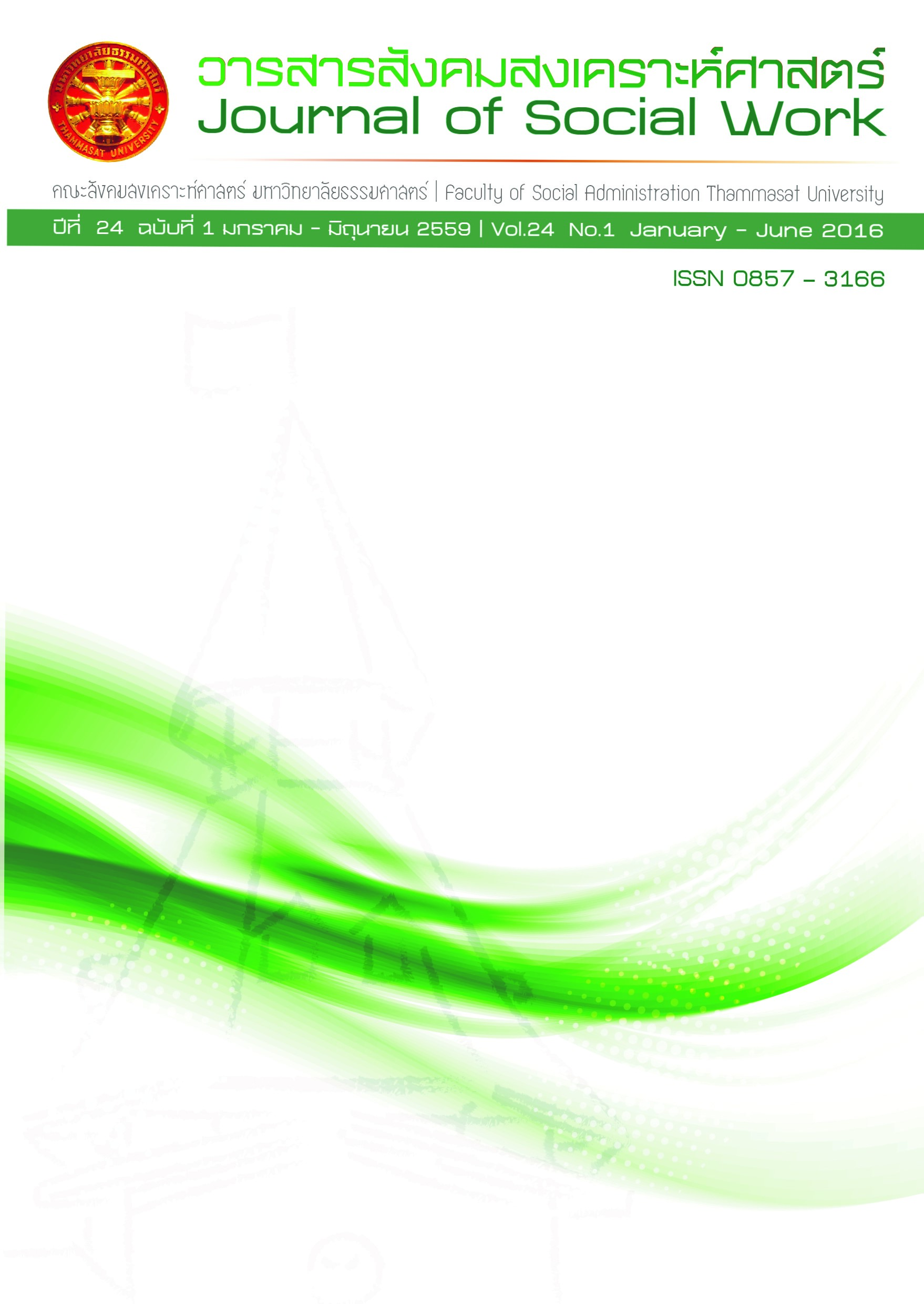The Study of Legal Development Guidelines for the Deprived People and Laws for the Deprived People Protection since 2557 B.E.
Keywords:
Legal Development, Protection, Deprived PeopleAbstract
This article aims to present the Study of Legal Development Guidelines for the Deprived People (The Destitute). The objectives of the study are twofold: First, to study the problems and the needs for legislative protection for the deprived people and examine the legal enforcement and obstacles in the implementation of the relevant legislation including international law in term of comparative study. Second, to generate law draft and policy recommendations concerning the deprived people. The study uses Qualitative Research Method through documentary research and field research. It was initiated by the Legal Division, Ministry of Social Development and Human Security in 2550 B.E., and assigned the task of the research to Social Administration Faculty, Thammasat University. The study has finalized the definition of the word. “The Deprived People(The Destitute).” The objectives of the research are achieved. Moreover, in an aspect of the administrative and policy measures, focused on human dignity and to meet the basic needs of the deprived people, are suggested. In an aspect of the legislative measures, a possible legal mechanism should be created, including a draft law for the Deprived People is proposed. Currently, the government has enacted “Laws for the Deprived People Protection” since 2557 B.E. that is likely consistent with the research. However, there are some differences, for example, the definition and how to access to the shelters of the deprived people. In practice, nevertheless, the process of protection can continue without obstacles. Meanwhile, the Law should be revised and improved in the future.
References
กรมคุมประพฤติ กระทรวงยุติธรรม (2549). สรุปโครงการสัมมนาทางวิชาการ เรื่อง “การพัฒนาและขยายระบบบ้านกึ่งวิถี” กรุงเทพมหานคร : กลุ่มสงเคราะห์ผู้กระทำผิด สำนักพัฒนาการคุมประพฤติ.
บุญเลิศ วิเศษ (2557). ร่าง พ.ร.บ.คนไร้ที่พึ่ง: คุ้มครองหรือซ้ำเติม. สืบค้นจากhttp://www.prachatai.com/journal/2014/10/55899.
ศักดิ์ชัย เลิศพานิชพันธุ์ และคณะ (2550). โครงการศึกษาแนวทางพัฒนากฎหมายสำหรับคนไร้ที่พึ่ง. คณะสังคมสงเคราะห์ศาสตร์ มหาวิทยาลัยธรรมศาสตร์ เสนอต่อ กระทรวงการพัฒนาสังคมและความมั่นคงของมนุษย์.
อภิญญา เวชยชัย และกิติพัฒน์ นนทปัทมะดุลย์ (2546). รายงานวิจัยฉบับสมบูรณ์ : การพัฒนาระบบสวัสดิการสำหรับคนจนและคนด้อยโอกาสในสังคมไทย : กลุ่มคนจนผู้ด้อยโอกาสและกลุ่มเสี่ยงที่ประสบปัญหาทางสังคม, กรุงเทพมหานคร : ศูนย์ศึกษาเศรษฐศาสตร์การเมือง คณะเศรษฐศาสตร์ จุฬาลงกรณ์มหาวิทยาลัย.
Adamczuk, Henryk (2005). “Statutory Homelessness within the UK: a comparative analysis of legal definitions and national data 2005” School of Planning and Housing University of Central England, Available from: http://www. borg.hi.is/enhr2005iceland/ ppr/Adamczuk.pdf.
Babergh District Council(2003). “Homelessness Review and Strategy 2003”. Available from: http://www.babergh-south-suffolk.gov.uk/NR/rdonlyres /B8D532C7-891F-4FB3-A28F-E7FF56D03DAA/0/HomelessnessRevie wand strategydeadline.pdf
Human Resources and Social Development Canada (2007), The New Homelessness Partnering Strategy. Available from: http://www.homeless ness.gc.ca/about_us/index_e.asp
Saltzman, Andrea and Furman, David M. Law in Social Work Practice. Illinois : Nelson-Hall Inc., 1999.
Shimokawa, Peter. “Japan’s Homeless People’ Situation” in Asian Coalition of Housing Rights, 2002. Available from: http://www.achr.net/japan_ 2002.htm
Downloads
Published
How to Cite
Issue
Section
License
The manuscripts published in the Social Work Journal is the copyright of the Social Work Journal, Thammasat University
Any article or opinion appeared in the Social Work Journal will solely be under the responsibility of the author The Faculty of Social Administration, Thammasat University and the editors do not need to reach in agreement or hold any responsibility.



